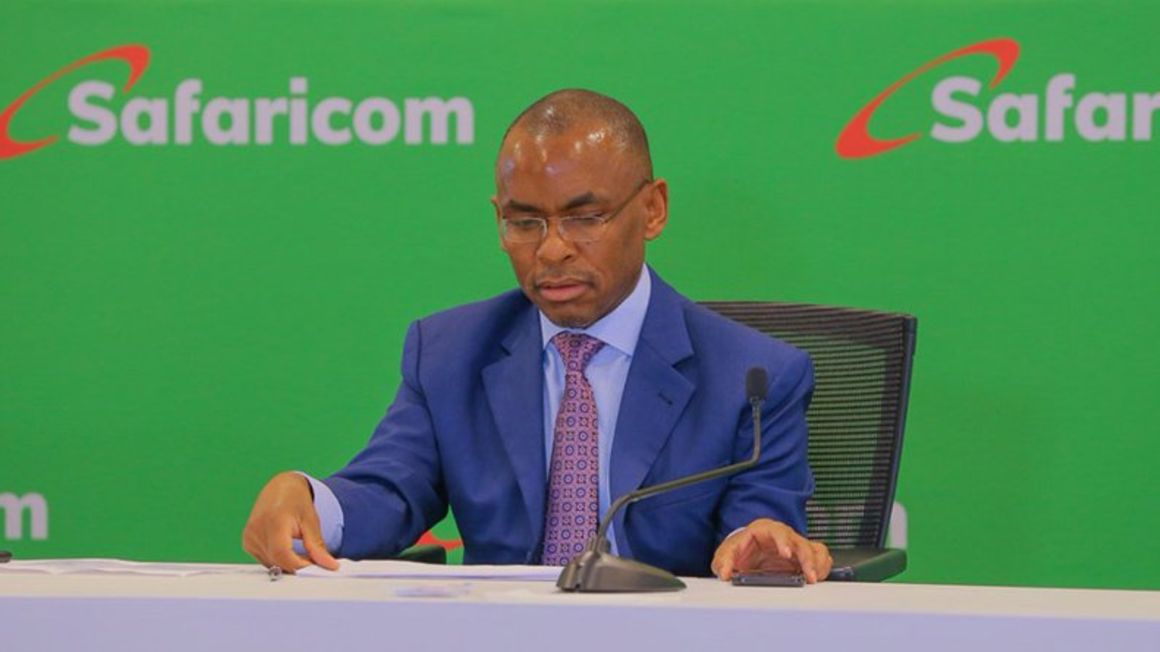
Safaricom CEO Peter Ndegwa. FILE PHOTO | NMG
Summary
- The loans came in a six-month period when Safaricom’s net profit dropped to Sh33 billion from Sh35.1 billion, hurt by the impact of the coronavirus crisis.
- The renewed borrowing appetite was driven by an early dividend payment besides increased investment in its mobile and financial service M-Pesa infrastructure.
- A bank executive familiar with Safaricom’s borrowings said that while the telco has significantly ramped up its borrowings, it is able to retire the debt in less than one year.
Safaricom borrowed additional short-term bank loans amounting to Sh24.7 billion in the half year ended September when its net profit dropped six percent due to removal of fees on M-Pesa transactions of up to Sh1,000.
KCB Group
is among the country’s major banks that provided the loans to Safaricom that the telco used to fund its dividend payments and infrastructure investments.
The loans came in a six-month period when Safaricom’s net profit dropped to Sh33 billion from Sh35.1 billion, hurt by the impact of the coronavirus crisis.
It is the first time in nine years Kenya’s most profitable firm is reporting a fall in earnings.
The move to take more loans, seen as a cash flow management measure, raised the telco’s debt load to a new high of Sh32.7 billion.
This marks the largest borrowing by the cash-rich firm which had in recent years become almost debt-free as it made enough money to fund its operations and pay dividends.
The renewed borrowing appetite was driven by an early dividend payment besides increased investment in its mobile and financial service M-Pesa infrastructure.
A bank executive familiar with Safaricom’s borrowings said that while the telco has significantly ramped up its borrowings, it is able to retire the debt in less than one year.
"This is management of working capital. The company [Safaricom] generates huge cash flows and that is why these loans are short-term," the bank executive said.
Safaricom paid a dividend of Sh1.4 per share or a total of Sh56 billion for the year ended March in the last two weeks of August.
The company, which previously made the distribution in September, said the early payout was a deliberate move to support shareholders, including the government, which needed funds to combat the Covid-19 pandemic.
The Treasury, through which the government holds a 35 per cent stake in the telco, received a dividend of Sh19.6 billion.
Safaricom also increased its capital expenditure in the review period 25.5 per cent to Sh22.7 billion. The company is upgrading its 4G network and plans to have the high-speed data technology available across the entire country by December. The coverage currently stands at 91 per cent.
The telco says the investment in technology upgrade will pay off in the coming years as more customers acquire smartphones and consume more data on the mobile devices.
"Whilst our capital intensity will show an increase this year, we are confident that the investment is well placed to support the future growth of the business," said Ilanna Darcy, Safaricom’s acting chief financial officer.
The company is helping customers with 2G or 3G handsets to buy 4G devices through its financing partnership with Google dubbed Lipa Mdogo Mdogo.
Under the programme, customers pay daily instalments of Sh20 for nine months after making a down payment of Sh1,000.
"This plan targets over 10 million Kenyans over the next few years who are using 2G phones to be able to purchase 4G phones affordably without straining their wallets," Mr Ndegwa said.
The profit drop was driven by falls in revenue from its mobile financial services, M-Pesa, and voice calls.
Revenue from provision of Internet services increased, but not enough to offset the drop in M-Pesa revenue and voice calls, the company told an online investor briefing.
Safaricom’s revenue dropped 4.1 per cent to Sh124.5 billion in the half year to September, reflecting weaker performance in the voice and M-Pesa business.
"The adverse service revenue performance is mainly attributed to the decline in M-Pesa and voice revenues. Relative to the prior year, voice declined 6.5 per cent as the growth in customers and usage is offset by continued downward movement on the effective rate per minute," the company said in a statement."Zero rating of M-Pesa transactions impacted M-Pesa revenue, which declined 14.5 per cent year-on-year."
Revenue from M-Pesa declined by Sh6.1 billion to Sh35.8 billion while that of voice contracted by Sh2.8 billion to Sh40.1 billion.
The Central Bank of Kenya (CBK) announced the removal of charges on M-Pesa transactions of up to Sh1,000 from March 16 until June 30, a period when bank-to-M-Pesa transactions would also be free.
The regulator later extended the relief measures until December 31.
Safaricom said its financial performance will improve once it resumes charging fees across all transaction amounts. There is, however, still uncertainty on whether the relief measures will be extended once more.
Safaricom’s chief executive Peter Ndegwa projected that the company could post earnings before interest and taxes (EBIT) in the range of Sh91 billion to Sh94 billion for the full year ending March 2021.
This will represent a decline of between 10.5 and 7.5 per cent from the actual EBIT of Sh101.5 billion recorded the previous year.
Mr Ndegwa said the forecast is based on three factors –the pandemic and its economic impact, how soon the telco reinstates fees on small M-Pesa transactions and how customers respond to it.
The company said its business recorded a major slowdown in the first quarter ended June when the pandemic struck the country, adding that it had seen substantial recovery since then.
"We have reported sustained recovery across most of our key performance indicators," Mr Ndegwa said, citing the example of customer numbers that rose 10.2 per cent to 30.3 million in the half year.





No comments :
Post a Comment